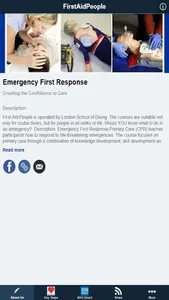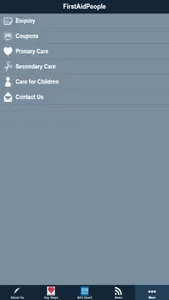Welcome
The ability to provide CPR/first aid assistance is a skill that has application in all areas of our lives. Whether you are a parent, school teacher, childcare worker, a builder in the construction industry or setting up your own business, you may find yourself in a situation where you need to provide emergency care for someone.
In today's work environment, occupational health and safety regulations in most countries require staff to be proficient in CPR and first aid skills. Gaining these skills needs to fit into busy schedules. Emergency First Response's flexible approach to learning makes our programs the first choice. You learn the basics in your own time through the use of our independent study materials, and then participate in practical hands-on training session with an experienced Emergency First Response Instructor at a time convenient for you. For detailed information about Emergency First Response’s flexible approach to learning, go to www.firstaidpeople.com.
Emergency First Response courses follow current emergency patient care standards as published in the American Heart Association Guidelines 2005 for Cardiopulmonary Resuscitation and Emergency Cardiovascular Care and the Basic Life Support (BLS) group of the International Liaison Committee on Resuscitation (ILCOR). You'll master these skills with the guidance of a skilled Emergency First Response Instructor, giving you the confidence to provide care in an emergency situation.
If you enjoy teaching, you can build on what you learn in the Emergency First Response Primary Care, Secondary Care and Care for Children courses by becoming an Emergency First Response Instructor yourself. As an Emergency First Response Instructor, you'll find many opportunities to teach CPR and first aid in the workplace and to lay people in your community
The ability to provide CPR/first aid assistance is a skill that has application in all areas of our lives. Whether you are a parent, school teacher, childcare worker, a builder in the construction industry or setting up your own business, you may find yourself in a situation where you need to provide emergency care for someone.
In today's work environment, occupational health and safety regulations in most countries require staff to be proficient in CPR and first aid skills. Gaining these skills needs to fit into busy schedules. Emergency First Response's flexible approach to learning makes our programs the first choice. You learn the basics in your own time through the use of our independent study materials, and then participate in practical hands-on training session with an experienced Emergency First Response Instructor at a time convenient for you. For detailed information about Emergency First Response’s flexible approach to learning, go to www.firstaidpeople.com.
Emergency First Response courses follow current emergency patient care standards as published in the American Heart Association Guidelines 2005 for Cardiopulmonary Resuscitation and Emergency Cardiovascular Care and the Basic Life Support (BLS) group of the International Liaison Committee on Resuscitation (ILCOR). You'll master these skills with the guidance of a skilled Emergency First Response Instructor, giving you the confidence to provide care in an emergency situation.
If you enjoy teaching, you can build on what you learn in the Emergency First Response Primary Care, Secondary Care and Care for Children courses by becoming an Emergency First Response Instructor yourself. As an Emergency First Response Instructor, you'll find many opportunities to teach CPR and first aid in the workplace and to lay people in your community
Show More

